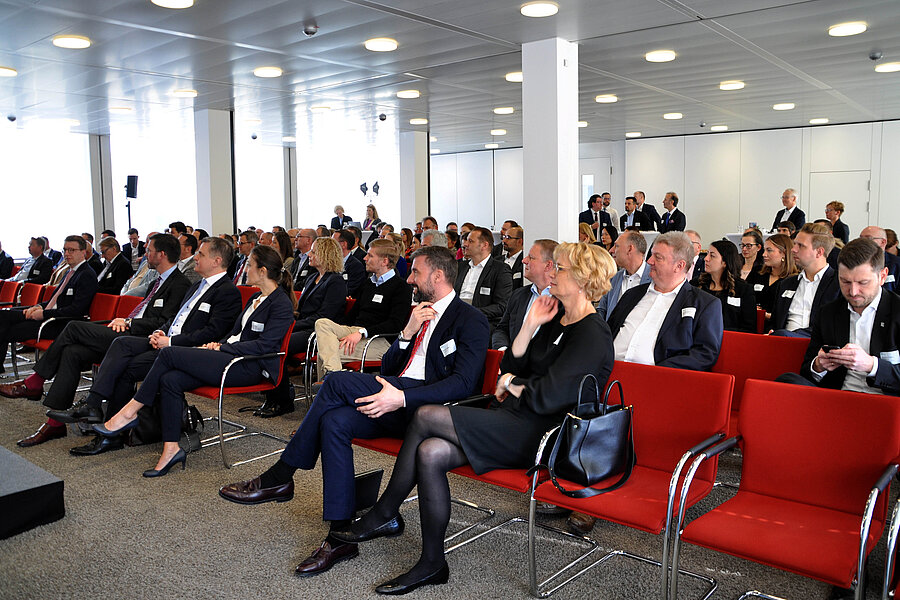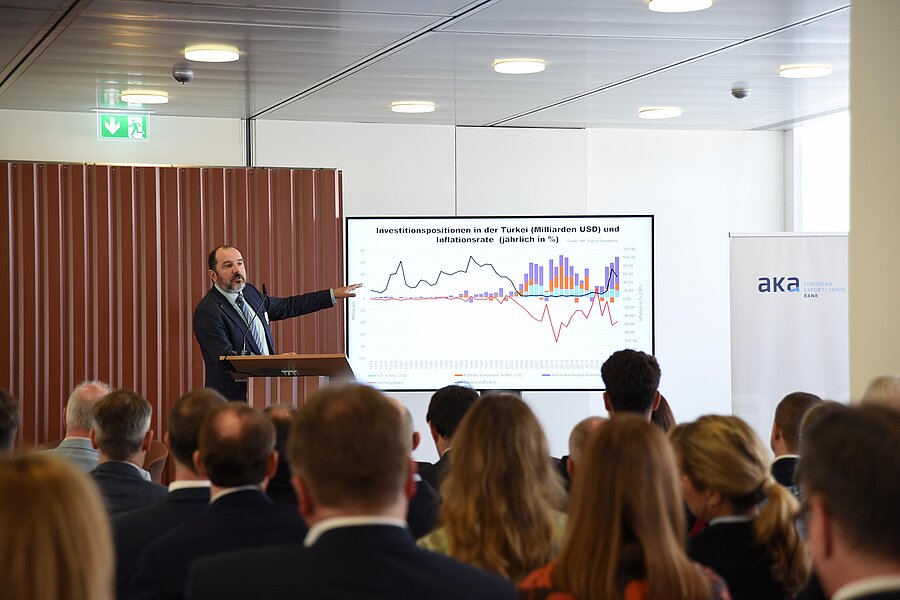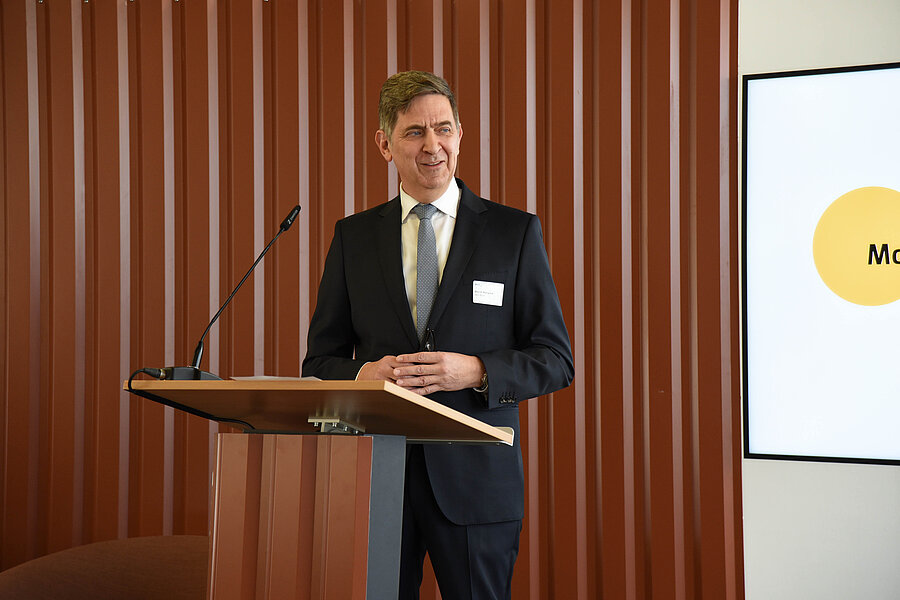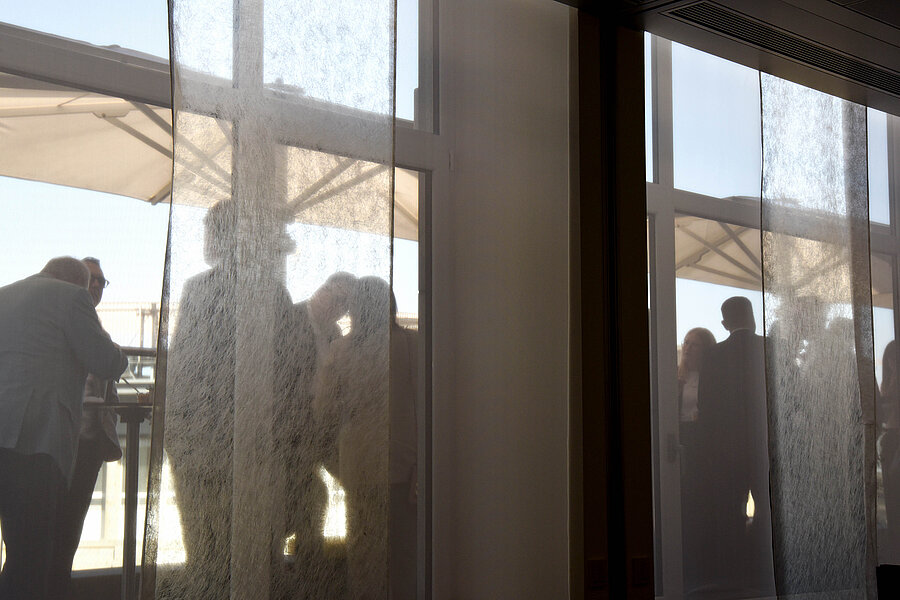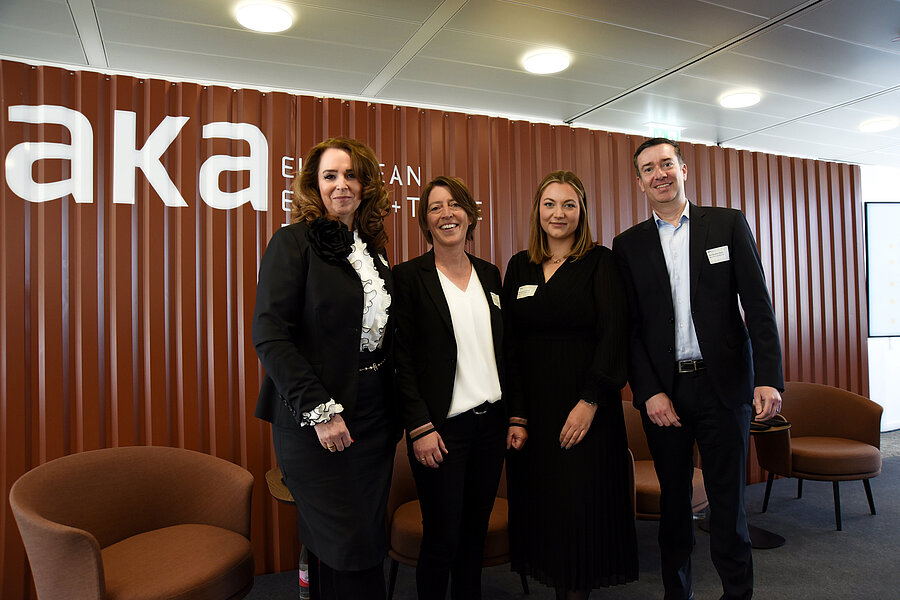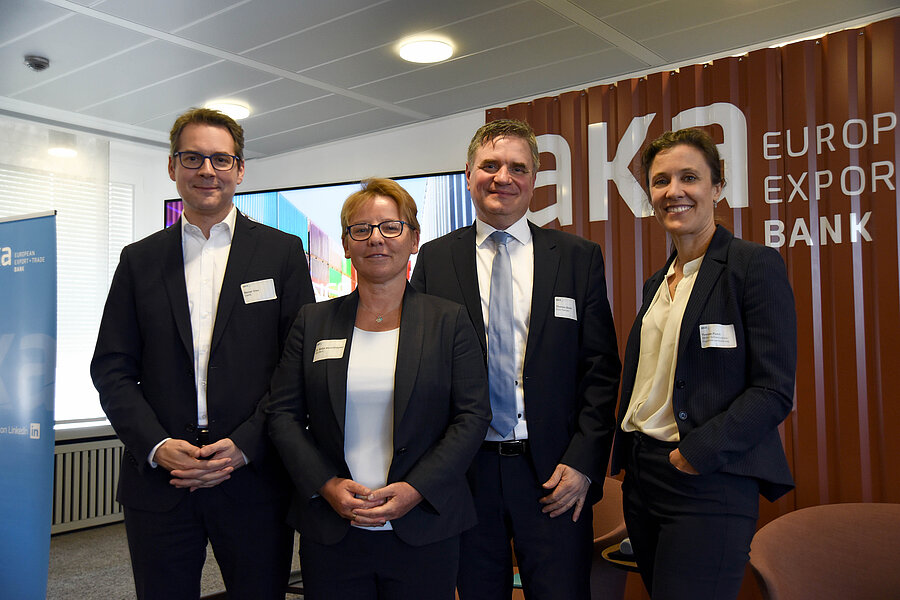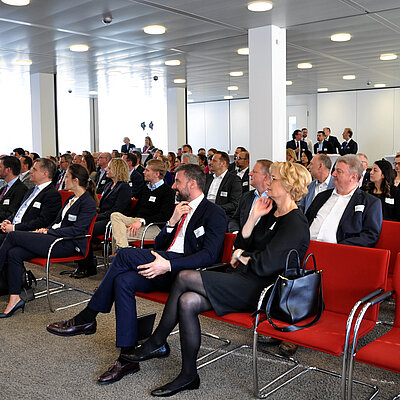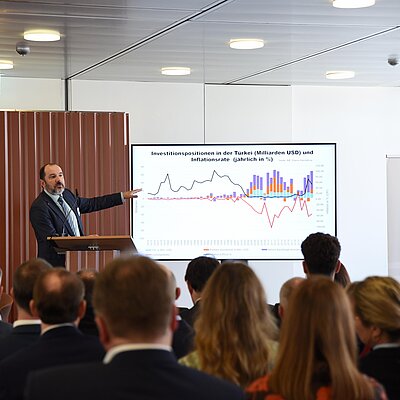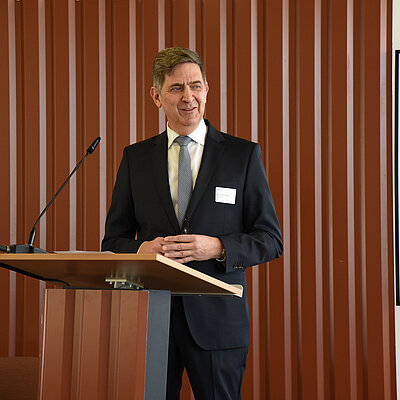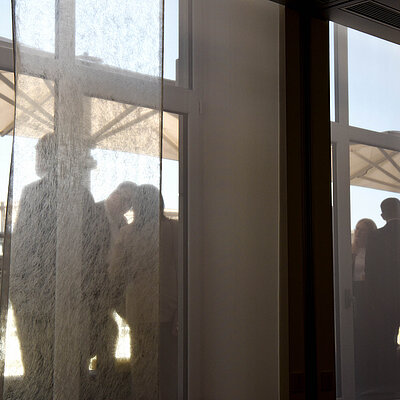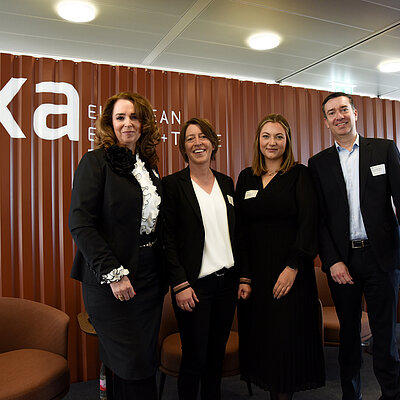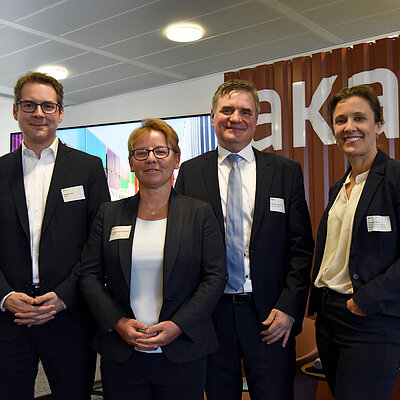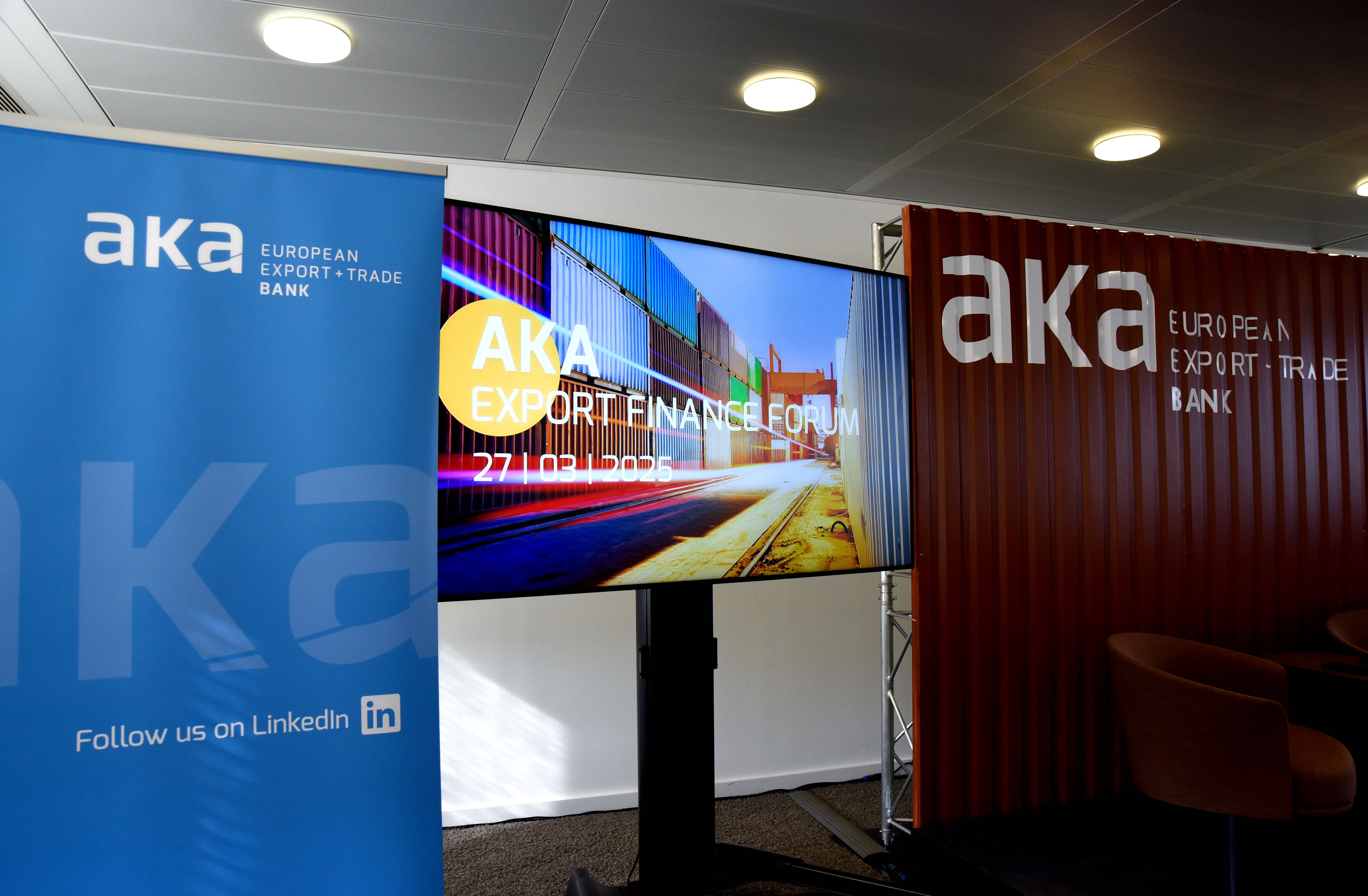
8 April 2025
AKA Export Finance Forum 2025
On 27 March, the AKA Export Finance Forum took place for the second time in the premises of AKA Bank in the centre of Frankfurt. More than 150 guests came to discuss current topics in the industry. In the morning, high-calibre speakers presented different perspectives on the global economic situation and possible policy instruments in the export environment, while in the afternoon panels experts discussed concrete measures and their implementation in the market.
The event was opened by Marck Wengrzik, CEO of AKA Bank. In his welcome address, he highlighted the dynamics that the economy has been exposed to since 2022 and the significantly increased pressure for change on all players in both economic and political life since the US elections.
Trade wars know no winners
The entertaining and informative morning briefing by Carsten Brzeski followed. ING‘s chief economist sorted through the daily rush of news from the USA on tariffs and trade restrictions and the resulting uncertainties for our guests: according to Brzeski, the speed of the news and changes is almost impossible keep up with.
However, the expert is not surprised by the signs coming from the US, as he sees them as following a previously recognisable roadmap from the Trump administration, which is operating under the macroeconomic maxim of „what is positive for the US economy“. According to Brzeski, regulation and tariffs are to be expected and a logical consequence from a US perspective. In Europe, on the other hand, no answer has yet been found yet, so a macroeconomic perspective is therefore not valid at this point in time.
One thing is certain, however: Trade wars know no winners.
Fragmentation and costs are increasing for the export world, while new trade flows from China are increasing the pressure. And for finance, the uncertainties are increasing inflationary pressure in Europe. In the long term, Brzeski expects key interest rate hikes and higher capital market interest rates.
There is no planning security for companies. ‘Europe always over promises and under delivers’ - says Brzeski.
High risk appetite of Turkish industry
These thought-provoking observations were followed by the keynote speech of Professor Dr Erdal Yalcin (Chair of International Economic Relations, Hochschule Konstanz - HTWG University of Applied Sciences) on the topic of "EU, Turkey and Central Asia: Economic Cooperation in Times of Geopolitical Dynamics. Professor Yalcin highlighted the resilience of German-Turkish trade relations, which have existed since the establishment of the Customs Union. A close production network, supported by intermediate goods, underpins the solid relationship between the two countries. Even as Turkish trade diversifies beyond Europe, Germany remains an important and reliable partner for Turkey, says Professor Yalcin. Increasing global uncertainty (World Uncertainty Index) is also a driver for Turkey and requires an adjustment in risk assessment. The challenges are credibility and reliability.
Professor Yalcin emphasised Turkey's export growth to Central African countries and the expansion of Turkish industry into Jordan and Central Asia; high-risk regions whose markets Turkish companies tend to enter. Turkey is therefore well positioned in emerging markets with similar structures. He sees an opportunity for exporters in the Germany-Austria-Swiss region to use Turkey as a bridge to growth markets. The issue of political integration is important for Turkey and needs to be clarified.
Current developments in export credit guarantees: Shoppingline and flex&cover approach
Eike Kreplin, Co-Chairman of the Interministerial Committee for Export Credit Guarantees at the Federal Ministry of Economics and Technology, gave a keynote speech under this title. With relatively stable growth in the short to medium term, the overall trend for Germany in 2026 is modest, with risks outweighing opportunities for the global economy. According to Kreplin, the proliferation of conflicts, cyber threats and the failure to address climate change are the main factors.
The geo-economic fragmentation that has accelerated since 2022 only knows losers - a reallocation in the differentiation of the blocs is recognisable.
In trade with the US and China, Germany has interdependencies and dependencies in both directions.
What does this mean for export credit guarantees? The aim should remain to safeguard industrial value creation, maintain resilience and future viability and enable competitive financing conditions. To this end, the German government has adopted a package of measures that offers the German export industry more flexibility, improved conditions and more efficient processes. The flexibilisation of the shopping line and the Hermes Cover „flex&cover“, which are intended to facilitate trade, should be mentioned here in particular.
According to Kreplin, the Federal Ministry for Economic Affairs and Climate Protection wants to position itself in such a way that the German economy can make the most of its potential in the future. In a highly dynamic geopolitical environment, situational reactions and a high degree of agility are required from all players.
After a refreshing networking break, the AKA Export Finance Forum 2025 continued with two panel discussions.
Export finance in transition: experts highlight opportunities and challenges
Dr Nadja Marschhausen (Chief Operating Officer, AKA Bank) moderated the expert panel on the topic of ECA: What changes will 2025 bring for the DACH region? She discussed the question with Rainer Dreo of OeKB, Yvonne Pusch of SERV and Thomas Baum of Euler Hermes: What can we do together to survive these turbulent times? Is there a change of perspective among ECAs and is a product needed for every emergency? Participants shed light on these questions from their own experiences.
High dynamism means a willingness to take risks and the courage to try something new - said Dr Marschhausen in her closing remarks.
Global Markets in Focus: Panel Discussion on Financing and Competition
Matthias Wietbrock (Head of Export & Agency Finance, AKA Bank) chaired the panel discussion entitled 'The Troika: EPC's, Packagers & Exporters - Powering Global Success. In a lively exchange with Dr Derya Deniz Yilmaz (CFO, Agaoglu Group), Dr Manuel Probst (Managing Director, Jebsen & Jessen) and Holger Korte (Head of Export & Project Finance, Big Dutchman), the panellists formulated how they react to market dynamics and which requirements for financial instruments are essential.
Dr Yilmaz emphasised the trusting and long-standing cooperation with German partners and summarised succinctly and impressively: "The relationship with banks is 50% about knowledge and 50% about trust."
Against the backdrop of the increasing number of global and local contracts, Dr Probst primarily addressed the need for ‘overall financing’ by lenders. Holger Korte pointed out the strong competitive pressure from China, but saw a gap between product promise and product performance. He also expects Euler Hermes' flex&cover approach to provide significant relief.
Lots of input, exciting insights and inspiring thoughts for all the guests, who continued the lively discussions at the get-together that followed.
